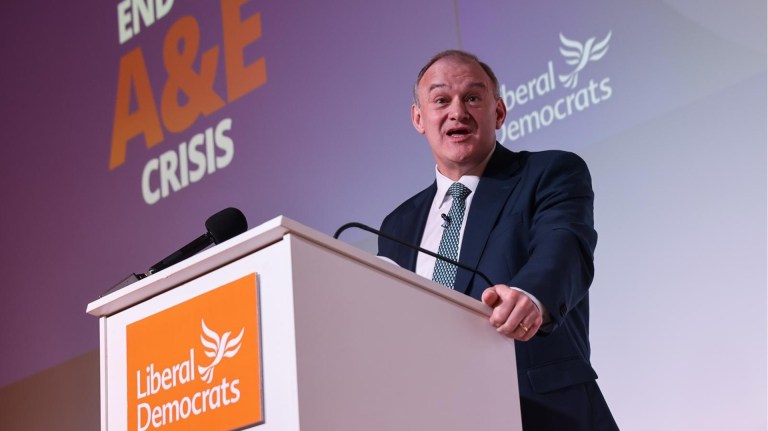The Britannia Card is intended to attract wealthy non-domiciled taxpayers to come to the UK with Reform arguing that tightening of the rules under the Conservatives and Labour governments has seen foreign billionaires take their money elsewhere.
Non-doms, as they are known, live in the UK but are considered to have their permanent home in another country.
The card would entitle people coming to the UK who pay the £250,000 entry fee be taxed on remittance, meaning foreign income and capital gains are only taxed when brought into the UK.
Farage, who the BBC reported last year is earning more than an estimated £1 million a year on top of his £93,904 a year salary as Clacton MP, added: “Many talented people are leaving and we want as many entrepreneurs, as many risk-takers, as many job creators, as many people paying lots of tax, as many people investing huge sums of money.”
Read more:
Reform UK’s plan has its critics. Tax expert Dan Neidle’s analysis found that the plan could cost the economy as much as £34 billion.
Advertising helps fund Big Issue’s mission to end poverty
Ellie Reeves, Labour Party chair, said: “Nigel Farage’s new policy is quite simply a bonanza for billionaires.
“Not only is this a golden giveaway to the rich, but experts warn this will leave a massive black hole in the country’s finances that working people will be left to pick up the bill for.
“Reform UK is not serious or credible. Every family in the country would foot the bill for their dangerous and unfunded Liz Truss-style policies which would devastate Britain’s economy.”
But what does the Britannia Card potentially mean for low-income households in the UK and economy?
What the Britannia Card could mean for low-income households
Reform UK’s policy is undoubtedly intended to appeal to low-income households where the party has been chipping away at Labour support – but there are question marks over whether the money would reach the people it promises to help.
The cash redistributed to poorer households is intended to be a tax-free lump sum.
Advertising helps fund Big Issue’s mission to end poverty
This poses “serious administrative challenges”, according to Stuart Adam, senior economist at the Institute of Fiscal Studies (IFS).
“For a start, HMRC currently has no way to identify whether a self-employed individual is working full-time – would the self-employed be included regardless of how much they worked, or excluded altogether? Neither choice seems satisfactory,” said Adam.
The current Labour government, like the Conservative regime before it, is trying to drive more people into work, including through controversial disability benefit cuts.
The Britannia Card offers a similar incentive but that means that those struggling the most would likely see no benefit.
“The policy would benefit the lowest-paid full-time workers, though this does not correspond to the lowest-income households, both because the lowest-income households do not generally have someone in full-time work and because many of the beneficiaries would have working partners and thus a higher household income than their own earnings might suggest,” added Adam.
“The policy would provide an incentive for people to move into (or stay in) full-time work, but also discourage low earners from increasing their earnings and risking losing eligibility for this payment.”
Advertising helps fund Big Issue’s mission to end poverty
What the Britannia Card could mean for the economy
Reform UK said the policy would make the “international wealthy feel welcome in the UK” and claims that if more than a quarter of the UK’s non-doms leave the country then the Treasury would incur heavy losses.
The party claimed that the Britannia Card would “deliver a significant, positive impact on the UK economy”.
It estimated that a “conservative uptake” of 6,000 individuals a year would generate between £1.5bn and £2.5bn annually – or up to £12.5bn over five years.
Reform also argued that low-income earners would spend the cash in their local economy, while also acknowledging that the cash might cover a month’s rent for someone on a low-wage job.
But the party’s launch document is less concerned with how much the favourable tax arrangements may potentially cost the economy.
Tax Policy Associates’ Dan Neidle suggested it could cost the economy around £34bn.
Advertising helps fund Big Issue’s mission to end poverty
He made the point that people who would ordinarily pay huge amounts in tax on their earnings would now pay the £250,000 instead.
His analysis cited the Office for Budget Responsibility’s (OBR) assessment of UK government reforms, which estimated £33.9bn would be raised from 2026-27 to 2029-30. This windfall is largely generated from changes that see new UK residents entirely exempt from tax for four years before being subject to income and capital gains tax like existing UK residents.
The tax expert said that many non-doms who already live in the UK would be able to essentially write off their tax bill through a Britannia Card.
Neidle also argued that the Britannia Card policy would deter highly skilled and highly paid professionals who don’t count themselves among the mega-rich billionaires from the UK. The tax expert said doctors, senior scientists and entrepreneurs may be put off by the £250,000 upfront fee.
He also said an initial fee would make the UK uncompetitive against other countries where special tax regimes exist for workers’ first few years living in a foreign county, citing Ireland, Denmark and France as examples.
Neidle said: “We therefore believe it’s fair to say that Reform UK’s proposal would cost around £34bn if it was enacted before 2026/27. That sum would therefore likely have to be funded by some combination of spending cuts and tax rises.”
Advertising helps fund Big Issue’s mission to end poverty
Zia Yusuf, head of what Reform UK is calling the ‘Department for Government Efficiency’, hit back at Neidle’s claims, insisting that the Britannia Card would “halt an exodus of non-doms and instead reverse it”.
He argued that the rate at which the wealthy are leaving the UK, rendered the OBR figure “obsolete and irrelevant” and cited articles from Bloomberg and Guido Fawkes.
But IFS senior economist Adam also questioned whether the policy will boost the economy.
Adam argued that the policy would be attractive to non-doms with high off-shore wealth but less appealing to anyone looking to invest their wealth in the UK.
The IFS analysis said that redistributing the £250,000 entry fee to low-income workers would be “neutral to the exchequer”.
Economic benefits would depend on take-up but the amount of cash lost in tax could be sizable, especially if non-doms can still also benefit from their foreign income and gains from being tax exempt for their first four years in the country under reforms announced last year.
Advertising helps fund Big Issue’s mission to end poverty
“Reform claims that ‘the Britannia Card all but guarantees a net positive outcome for the Treasury’, but that is far from clear,” said Adam.
“Those attracted to the UK by the policy would typically end up paying a large amount of tax on their UK income (on top of the fee for the Britannia Card), benefiting the exchequer.
“But for those who would have been in the UK (and paid tax on their UK income) anyway, the exchequer would lose the tax they would otherwise have paid on their foreign income and gains – which must be at least enough for them to prefer to pay £250,000 to avoid it, and would often be far more than that.”
Promises are easy to break. Sign Big Issue’s petition for a Poverty Zero law and help us make tackling poverty a legal requirement, not just a policy priority.
Do you have a story to tell or opinions to share about this? Get in touch and tell us more. Big Issue exists to give homeless and marginalised people the opportunity to earn an income. To support our work buy a copy of the magazine or get the app from the App Store or Google Play.









